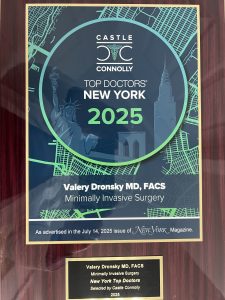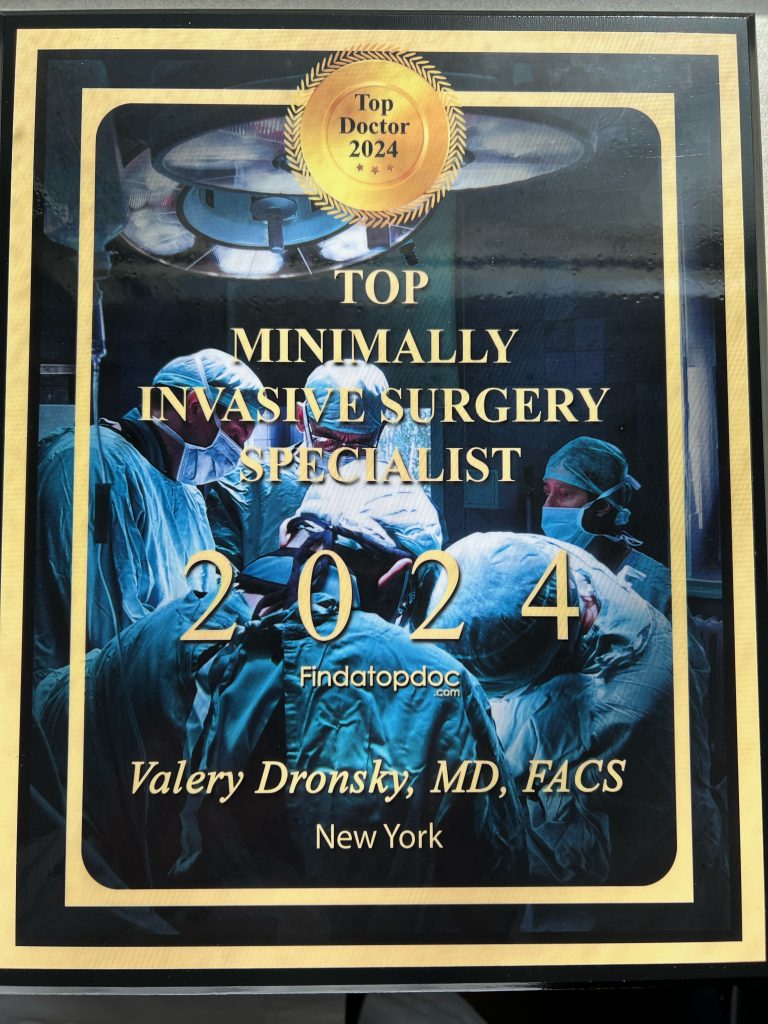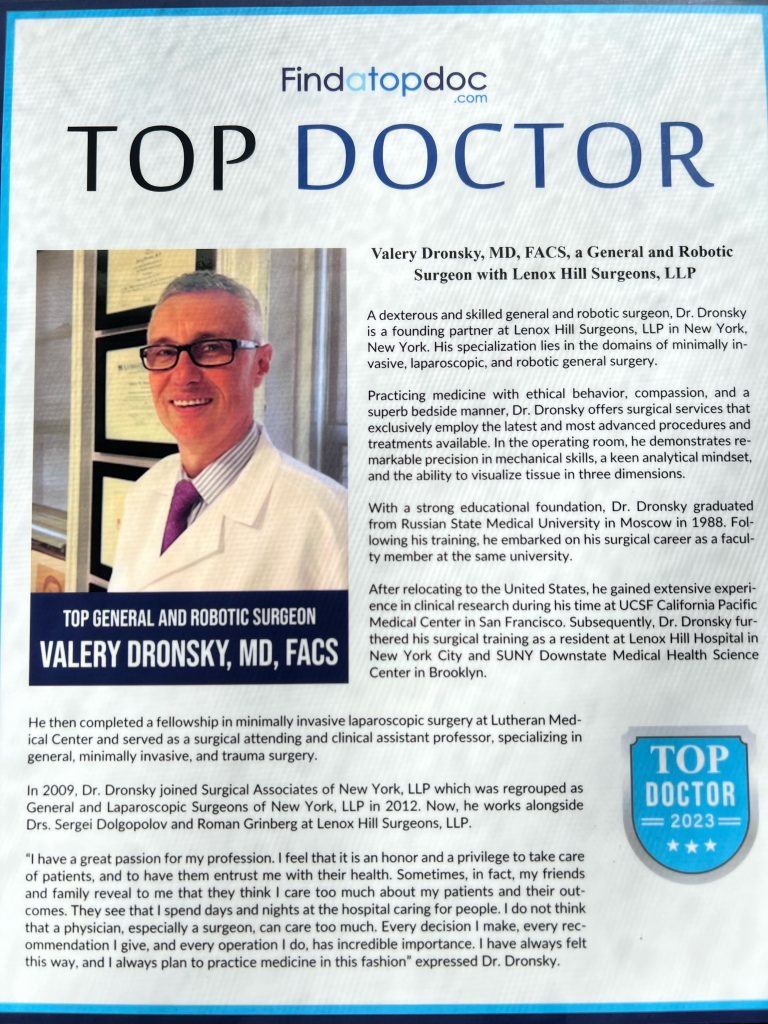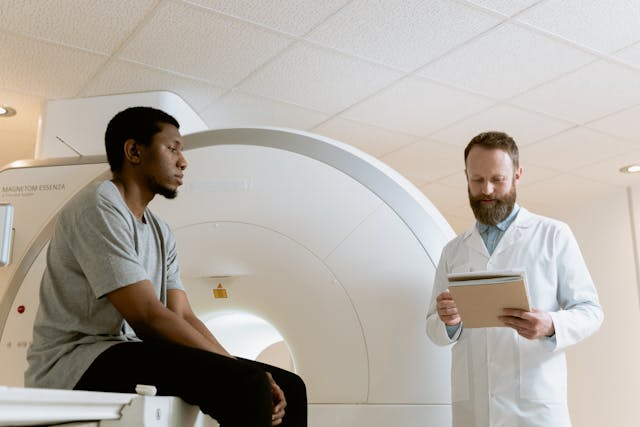CALL TODAY 646-846-1136 | EMAIL
Surgical Experts Dedicated to Improving Lives
At Lenox Hill Minimally Invasive Surgery PLLC, Dr. Valery Dronsky and his staff of medical professionals provide compassionate care with the highest ethical & professional standards. In our state of the art facility, we offer surgical services using only the most cutting edge and current procedures and treatments. We specialize in general surgery, including extensive experience in performing hernia repair surgery. Our expertise is in minimally invasive surgery and robotic surgery. Minimally invasive and robotic surgery often allow patients to experience easier recovery than traditional open surgery. They also allow for more precise and less traumatic surgery. When robotic and minimally invasive surgery is not an option, we are also skilled and experienced in traditional open surgical procedures.
Dr. Dronsky is an experienced and highly skilled surgeon having undergone extensive training in school, residency and fellowships. He practices medicine with ethical behavior, compassion and superb bedside manner. In the operating room he exhibits precision mechanical abilities, analytical thinking and the ability to visualize tissue in three dimensions. These innate and learned skills allow Dr. Dronsky to be one of the most dexterous and skilled professionals in New York City and the Country.
Call us: 646-846-1136
PATIENT TESTIMONIALS
Recent Awards
We are honored and deeply appreciative to have consistently received prestigious awards and recognition year after year, establishing us as one of New York’s foremost hospitals for a wide range of general surgeries, safety measures, specialized procedures, and overall excellence in healthcare. At Lenox Hill Minimally Invasive Surgery, our unwavering commitment lies in delivering exceptional care and unwavering support to our patients, guaranteeing their safety and successful recovery throughout their entire surgical experience.
Hospital Quality Awards
 America’s 50 Best Hospitals Award™ (2023, 2022)
America’s 50 Best Hospitals Award™ (2023, 2022)
Top 1% in the nation for providing the highest clinical quality year over year.

America’s 100 Best Hospitals Award™ (2021)
Top 2% in the nation for consistently delivering clinical quality year over year.

America’s 250 Best Hospitals Award™ (2023, 2022, 2021)
Top 5% in the nation for consistently delivering clinical quality.

Patient Safety Excellence Award™ (2023, 2022)
Top in the nation for providing excellence in patient safety by preventing infections, medical errors, and other preventable complications.
Specialty Clinical Quality Awards

America’s 100 Best Hospitals for Cardiac Care Award™ (2023, 2022, 2021, 2020, 2019)
Superior clinical outcomes in heart bypass surgery, coronary interventional procedures, heart attack treatment, heart failure treatment, and heart valve surgery.

America’s 100 Best Hospitals for Coronary Intervention Award™ (2023, 2022, 2021, 2020, 2019)
Superior clinical outcomes in coronary intervention procedures (angioplasty with stent).

America’s 100 Best Hospitals for Prostate Surgery Award™ (2023, 2022, 2021)
Superior clinical outcomes in prostate removal surgery and transurethral resection of the prostate.
Click to see all of our Healthgrades best doctors awards





Visit our main website at www.LenoxHillMinimallyInvasiveSurgery.com
Blog Posts are Below:
Category Archives: Pre operative
Preparing for Surgery: What Patients Need to Know
This guide covers essential steps and considerations when preparing for surgery, from preoperative consultations to post-surgical recovery. Undergoing surgery—whether minimally invasive or traditional—is a major medical event that requires preparation, both physically and mentally. Whether it’s a planned procedure like a hernia repair or an urgent appendectomy, knowing what to expect can help reduce anxiety and improve your outcome.

Step 1: Understand the Procedure
The first step in preparing for surgery is to fully understand what the procedure involves. Your surgeon will explain:
- The goal of the surgery
- How the procedure will be performed (laparoscopic, robotic-assisted, or open surgery)
- Expected benefits and possible risks
- Recovery timeline and potential complications
Don’t hesitate to ask questions or request additional resources to help you understand your condition and treatment.
Step 2: Attend a Preoperative Consultation
Before surgery, you’ll have a comprehensive pre-op visit that may include:
- Physical exam
- Blood tests and imaging (X-ray, CT scan, EKG)
- Discussion of your medical history and medications
- Instructions on fasting and medication adjustments
This appointment ensures you’re medically fit for surgery and helps the surgical team tailor the care plan to your needs.
Step 3: Prepare Your Body
Optimizing your health before surgery can lead to faster recovery and fewer complications. Some preparation tips include:
- Quit smoking: Smoking impairs healing and increases the risk of infections.
- Stay active: Light exercise can improve circulation and immune function.
- Eat a balanced diet: Proper nutrition supports healing and energy levels.
- Manage chronic conditions: Keep diabetes, high blood pressure, or other illnesses under control.
Your doctor may advise you to stop taking certain medications such as blood thinners or NSAIDs before surgery.
Step 4: Follow Pre-Surgery Instructions
Adhering to all pre-op instructions is crucial for a safe and successful surgery. You may be instructed to:
- Fast for at least 8 hours prior to surgery (no food or drink)
- Shower with antibacterial soap the night before and the morning of surgery
- Avoid applying lotions or cosmetics on the day of surgery
- Remove contact lenses, jewelry, and nail polish
- Arrange for a friend or family member to drive you home afterward
Make sure to notify your doctor if you experience fever, flu symptoms, or new health issues in the days leading up to surgery.
Step 5: Pack Smart for the Hospital
If your surgery requires a hospital stay, packing appropriately will make your experience more comfortable. Consider bringing:
- Photo ID and insurance information
- Comfortable clothing and non-slip socks
- Toiletries (toothbrush, face wipes, etc.)
- Phone and charger
- List of medications and allergies
Leave valuables at home, and be sure to label any personal items.
Step 6: Mental and Emotional Preparation
Feeling anxious before surgery is completely normal. Managing stress can improve healing and overall well-being. Strategies to reduce anxiety include:
- Deep breathing or mindfulness meditation
- Discussing your concerns with your surgical team
- Listening to music or reading to stay distracted
- Relying on your support system for encouragement
Some patients benefit from speaking with a counselor before undergoing surgery, especially if they’ve had negative experiences in the past.
Step 7: Understand What Happens on Surgery Day
On the day of surgery, you’ll be admitted to the surgical facility and prepped for the procedure. This includes:
- Changing into a hospital gown
- Meeting your anesthesiologist
- Receiving an IV for medications and fluids
- Final verification of your identity and procedure site
Once in the operating room, you’ll be given anesthesia and monitored closely throughout the procedure.
Step 8: Plan for Postoperative Recovery
Knowing what to expect after surgery helps you prepare your home and schedule accordingly. Post-op planning should include:
- Stocking up on easy-to-prepare meals
- Arranging for help with chores or childcare
- Filling any prescriptions ahead of time
- Scheduling follow-up appointments
Ask your surgeon about activity restrictions, signs of complications, and when you can return to work or normal routines.
Preparing for Surgery Conclusion: Preparation Makes a Difference
Successful surgical outcomes depend not only on the skill of the surgical team but also on how well you prepare. By following your surgeon’s guidance and taking proactive steps, you’ll set yourself up for a smoother, quicker recovery.
If you’re planning to undergo surgery and want expert care every step of the way, the team at Lenox Hill Minimally Invasive Surgery PLLC is here to help. We prioritize patient education, safety, and comfort to ensure the best possible surgical experience.
Contact Information
LENOX HILL MINIMALLY INVASIVE SURGERY PLLC
Dr. Valery Dronsky
117 E 77th Street
New York, NY 10075
646-846-1136
admin@lenoxmis.com
Visit us online: https://www.lenoxhillminimallyinvasivesurgery.com
Preparing for Surgery: A Patient’s Guide
Preparing for surgery can be a daunting experience, but proper preparation can help ensure a smoother process and recovery. Here’s a comprehensive guide to help you get ready for your surgical procedure.

Preparing for Surgery
Preoperative Instructions
Follow all preoperative instructions provided by your surgeon. These may include dietary restrictions, medication adjustments, and fasting requirements. Make sure to understand and adhere to these guidelines to avoid any complications on the day of surgery.
Medical Evaluations and Tests
Your surgeon may require several medical evaluations and tests before the surgery. These could include blood tests, imaging studies, and EKGs to ensure you are fit for surgery. Attend all pre-surgical appointments to address any potential health issues.
Discuss Medications and Supplements
Inform your surgeon about all medications and supplements you are taking. Some substances can interfere with anesthesia or increase bleeding risk. Your surgeon may advise you to stop taking certain medications before surgery.
Prepare Your Home
Arrange your home to accommodate your post-surgery needs. Set up a comfortable recovery area with easy access to essentials. Stock up on groceries, medications, and any necessary medical supplies.
Arrange Transportation and Support
You will need someone to drive you home after the surgery and possibly assist you for the first few days. Arrange for a friend or family member to provide transportation and support during your recovery.
Follow Fasting Guidelines
If instructed to fast before surgery, follow the guidelines precisely. Typically, this means no food or drink after midnight on the night before your surgery. Fasting reduces the risk of complications from anesthesia.
Pack a Hospital Bag
Pack a small bag with essentials you might need during your hospital stay. Include items such as comfortable clothing, toiletries, identification, insurance information, and any necessary medical documents.
Understand the Procedure and Risks
Have a thorough discussion with your surgeon about the procedure, including the expected outcomes and potential risks. Understanding what to expect can help alleviate anxiety and ensure you are fully informed.
Post-Surgery Recovery Plan
Discuss your post-surgery recovery plan with your surgeon. Know what activities you can and cannot do, how to manage pain, and signs of potential complications. Follow all postoperative instructions carefully to promote healing.
Stay Informed and Ask Questions
Don’t hesitate to ask your surgeon or healthcare team any questions you may have about the procedure or recovery. Being informed helps you feel more in control and reduces anxiety.
Preparing for Surgery: Conclusion
Proper preparation is key to a successful surgery and smooth recovery. By following these guidelines, you can help ensure that you are physically and mentally ready for your procedure.
For personalized surgical care and comprehensive preoperative guidance, contact the specialists at Lenox Hill Minimally Invasive Surgery in New York City. Our experienced team is dedicated to providing the highest quality care and support throughout your surgical journey.
LENOX HILL MINIMALLY INVASIVE SURGERY
117 E 77th Street
Suite 1A
New York, NY 10075
646-846-1136
admin@lenoxmis.com
https://lenoxhillminimallyinvasivesurgery.com/















